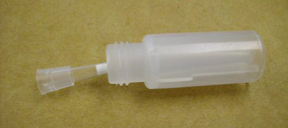Agilent 600MHz NMR

Magnet:
14.1 Tesla 54 mm bore Agilent Premium Compact Shield Superconducting Magnet
Probes:
Agilent’s Probes
OneNMR Probe (1H-19F/15N-31P 5 mm PFG OneNMR Probe):
Unique design provides high performance for both high frequency (1H-19F) and low frequency (15N-31P) observe and decouple experiments.
HCN Probe (1H{13C/15N} 5mm PFG Triple Res Probe):
Designed for the study of biomolecules (protein and peptide)
CapNMR™ Probes (flow probes):
CapNMR™ probe combines recent scientific advances in capillary-scale fluidics and enhanced mass sensitivity to provide a highly sensitive, cost-effective, and robust platform for flow NMR analysis of microliter volumes and nanomole quantities.
ICG probe:
Direct proton / indirect carbon probes equipped with VT and z-axis pulse field gradients. Optimized for proton detect experiments: 1H, COSY, TOCSY, NOESY, 13C HSQC, and 13C HMBC.
Phosphorus Probe:
Probe optimized for 31P detect experiment, which can also been used for proton NMR experiments.
One Minute-NMR™

One Minute-NMR™ is a fully automatic sample handling and data acquisition system. Just load the samples, queue them in the One Minute-NMR™ software interface, and return to your office and wait for an email indicating your data has been acquired.
Sample preparation for flow probes
Microvials for Volatile Solvents:
The recommended vial for volatile solvents. These vials have weeks-long holding times.

Filtration for Microvials Techniques to prefilter your samples into microvials prior to running on the OMNMR system:

Data processing software: Mnova NMR data analysis software can be installed by following the instruction: https://scs.illinois.edu/resources/cores-scs-service-facilities/nmr-lab…
Acknowledgement:The National Institutes of Health (NIH) are tracking publications that use data from instruments purchased with NIH S10 money and requiring acknowledgement of S10 funding. To comply with this requirement, we are requesting that publications using data from the IGB 600MHz NMR add a line in the acknowledgement that reads, “Some of this data was collected in the IGB Core on a 600MHz NMR funded by NIH grant number S10-RR028833.” We will be tracking these publications also. Therefore, it would be helpful to us to be informed when papers are published. Please email Hannah McClellan with any references of papers you have published in the past and going forward using NMR data. Providing proof that this instrument is productive will help with future funding. Thank you for your assistance.
Contact person: Glenn Fried, gfried@illinois.edu
Location: 109F, Carl R. Woese Institute for Genomic Biology